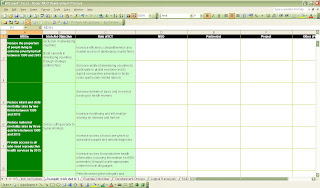Having worked with both Donors and with organisation applying for/complying with Donor requirements I have been able to bring together in a single methodology (i.e approach to understanding; assessing; evaluating & actioning) the entire Development process from an NGO management perspective:

This graphic show the simplified explanation (using animination graphics in powerpoint) to show the movement of a grain of Maze from a US Farmer through the chain of events (Value Chain); and associated management responsibilities of each player in this chain until it finally reaches the beneficiary. You can see that there are shared responsibilities across all participants in the process, with each being dependent on the other for the successful completion (and compliance) of the development project:

From the perspective of an NGO, or a Donor looking to partner with an NGO, there are 4 primary links in the Develoment Value Chain:
- Needs Analysis: Rationale for the development intervention; Mainstreaming requirements; Capacity Building & Sustainability
- Solution Design: Proposal Design (Logical Framework); Budgeting; Risk Identification; Intervention Strategy; Entry Strategy and Exit Strategy
- Project Management: Project Implementation; Financial Management; Risk Management; Change Management; Project Governance & Project Closure
- Monitoring & Evaluation: Progress Monitoring; Financial Control; Knowledge Management & Project Evaluation

The model is IrishAid - drawing on their specific donor priorities and requirements, plus requirements for specific initiatives (in the following exanples Technology in Developmemt and Volunteering).



The combination of each of these phases allows the Development partners to prepare an enhanced Logical Framework that reflects not only the traditional elements of a LogFrame (Needs Analysis & Solution Design) but also the key aspects for ongoing Project Management; Project Monitoring and the final Project Evaluation:
.jpg)
.JPG)










